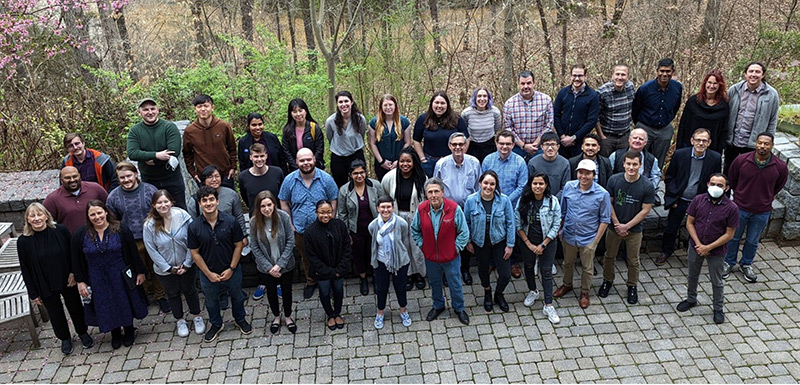Written by the UGA Graduate School
Interview with grant recipients Robert Haltiwanger, Ph.D., GRA Eminent Scholar in Glycosciences and Professor of Biochemistry and Molecular Biology, and Jon Amster, Ph.D., Distinguished Research Professor and Professor of Chemistry

Fostering excellence in graduate education through supporting and advancing the research, teaching, and outreach missions of UGA is the top priority of the Graduate School. As such, we proudly celebrate the National Institutes of Health awarding their T32 Institutional Training Grant to UGA’s Glycoscience Training Program.
The support this grant provides will enable the extensive training of predoctoral students, integrating chemical and biological approaches. Incoming graduate students from the Interdisciplinary Life Sciences and Chemistry departments will be chosen to participate in the training program, with an emphasis on recruiting those students who may be disadvantaged or from underrepresented minorities.
Grant recipients, Robert Haltiwanger, Ph.D., GRA Eminent Scholar in Glycosciences and Professor of Biochemistry and Molecular Biology, and Jon Amster, Ph.D., Distinguished Research Professor and Professor of Chemistry, shared their thoughts on the importance of the grant in furthering the ability to train graduate students for advancing research in this exciting field.
Why are you passionate about the field of research supported by this NIH T32 grant?
The area of Glycosciences, or complex carbohydrates, encompasses nearly all aspects of biology, including cancer, infectious diseases, immune function, and development. All cells, from bacteria to human, are surrounded with a carbohydrate-rich coat called the glycocalyx. Loss of specific complex carbohydrates in humans often causes birth defects, and when cells turn cancerous, there are multiple changes in their glycocalyx. In addition, many vaccines are based on the complex carbohydrates on the surface of bacteria or viruses.
UGA has one of the world’s leading centers of research in this area, the Complex Carbohydrate Research Center (CCRC). This NIH T32 predoctoral training grant is designed to introduce doctoral students to this amazing and understudied area of research. Training the next generation of scientists with an understanding of glycoscience is essential to enhance our understanding of the complex carbohydrates on all of our cells.
What factors do you believe contributed the most to the approval of this grant?
First and foremost, NIH looks for expertise in the area of training. Since the CCRC is a leading center of glycoscience research, it is one of the few places in the country that can offer this training. In addition, NIH looks for how we will support, train, and mentor our students, how we will work to enhance diversity in the biomedical workforce, and how we will reinforce concepts of Rigor, Reproducibility and Transparency in Research, as well as Responsible Conduct of Research.
How will this grant advance research in the field of Glycosciences, and how do students contribute to the process?
This grant will propel research in two ways. First, since the graduate students supported by the grant are performing research in the area, they will add to our knowledge of glycosciences. Students are the frontline workers in a research environment. While faculty generate research ideas and secure funding to support work in their laboratories, graduate students are the ones who are actively performing experiments and keeping the research enterprise moving forward.
Secondly, since we provide significant training in the area of glycosciences, our graduates will carry that knowledge with them wherever they go, as apostles for the field. The National Academy of Sciences issued a report in 2012 entitled, “Transforming Glycosciences: A Roadmap for the Future.” A major emphasis of the report was increasing training in the glycosciences. Our T32 training grant is a response to that call.
What do you hope to gain by receiving this grant?
In addition to gaining knowledge and influence in the field of glycosciences and the biomedical community, as mentioned above, this grant will help us to recruit talented graduate students who are motivated to engage in this area of research.
What does it mean to you to receive this grant?
It is always satisfying to receive a grant because it reinforces the importance of what we do. We are very happy to receive this grant from NIH since it confirms our commitment to the field of glycosciences.
